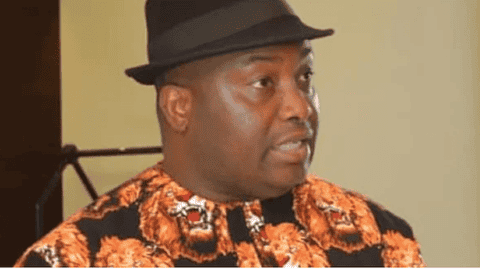
The killing of five security detail and aides of Senator Ifeanyi Ubah last Sunday from a bloody ambush by suspected assassins in Anambra State is a strong evidence of the worrisome deterioration of security in the South-east,Louis Achi writes
When Senator Ifeanyi Ubah, representing Anambra South Senatorial District in the National Assembly drove into Enugwu-Ukwu Community in Njikoka Local Government Area of Anambra State with his convoy, last Sunday, September 10, little did he know that he had entered a carefully prepared kill-zone.
Heavily armed, “unknown gunmen,” presumably assassins sprung a commando-type ambush and opened withering fire on the convoy. Three police officers and two aides of the senator were killed in the incident while Ubah escaped by the whiskers, with the aid of his bullet-proof vehicle. The five South-east Zone’s constituent states – Abia, Anambra, Ebonyi, Enugu, and Imo were considered Nigeria’s safest for many years out of the six geopolitical niches. But today, it’s a different story.
According to the 2019 report by Nigeria Mourns, the South-east Zone recorded the fewest number of reported killings with 94 deaths. The South-west came second – recording 157 deaths with the South-south coming third with 341 deaths. The North-central notched 469 deaths and the North-east recorded 1009 while North-eest recorded a grisly 1,118 deaths.
In their investigative analysis by Oluwole Ojewale and Freedom Onuoha which sought to deconstruct the spiralling bloody violence in the South-east Zone, the duo noted that while no zone or state in Nigeria is immune to violence, insecurity in the South-east is particularly worrying. They correctly held that structures, institutions and personnel responsible for providing security, management and oversight at national and local levels are lacking.
In their words: “The significance of the South-east to national development cannot be ignored, and conflict here risks destabilising the area’s economy. Cities such as Onitsha, Aba and Nnewi have emerged as manufacturing and commercial hubs, with export links to other Central and West African countries. Manufacturing makes up 31 per cent and 30 per cent of businesses in Onitsha and Aba. The unfolding violence in the South-east poses a serious threat to economic development and social stability.
“The dramatic surge in the activities of the criminals described as ‘unknown gunmen’ has not occurred in a vacuum. It’s a result of separatist agitation and associated repressive state responses, and the designation by the federal government of the Indigenous People of Biafra (IPOB) as a terrorist organisation
“The deterioration of security comes amid a growing campaign for Biafran independence staunchly championed by the IPOB, led by Nnamdi Kanu, with a huge following of young people born after the Nigerian civil war. Their desire for an independent Biafra state is fuelled by a feeling of marginalisation and historical grievances against the government.”
Oluwole Ojewale is ENACT Regional Organised Crime Observatory Coordinator – Central Africa, Institute for Security Studies (ISS) Regional Office for West Africa, the Sahel and the Lake Chad Basin, while Freedom Onuoha is a Senior Lecturer in the Department of Political Science and Coordinator Security, Violence and Conflict Research Group, University of Nigeria, Nsukka.
Regrettably, the government has responded to separatist agitation through iron-fisted, aggressive militarisation, security crackdowns and mass arrests of supporters and youths. This approach provokes further extremism.
Amnesty International documented at least 115 people killed by security forces between March and June 2021, with over 500 arrested after police and military raids in response to spiralling violence in the South-east. Since 2021, the relatively calm region has taken a violent twist with frequent clashes between government forces and pro-Biafra supporters.
Even as concerns about the violence and kidnappings associated with bandits and rogue herders mount, IPOB’s leader, Kanu, who is now facing terrorism charges, said the group needed to protect the South-east and launched a security outfit named the Eastern Security Network (ESN) on December 13, 2020.
Emma Powerful, IPOB’s spokesman, had said the objective of the network is to protect the South-east from “criminal activity”, adding that ESN is a replica of Amotekun, a security outfit established by the governors of the South-west to cage insecurity in that zone. While ESN has been blamed for escalating attacks on civilians and government facilities and security personnel in the South-east, the outfit has consistently exonerated itself from these atrocities.
But notwithstanding the launch of ESN theoretically to ensure zonal security, recent data from Council on Foreign Relations (CFR) and media reports show that killings in the South-east zone scaled up by 555.7 per cent between 2020 and 2021.
Media reports of violent attacks collated by CFR and other media platforms were analysed to ascertain the number of killings in the South-east. The analysis was from January 1, 2020, to December 12, 2021.
Based on the data obtained, the South-east recorded 97 deaths in reported violent attacks between January 1, 2020 and December 12, 2020, while 636 deaths were recorded in reported violent attacks between December 13, 2020, and December 12, 2021.
Significantly, Imo State recorded the highest number of fatalities with 208 deaths, representing 32.7 per cent of the total figure within one year. Imo was followed by Anambra with 187 deaths; Ebonyi recorded 103 deaths, followed by Abia with 70 deaths. Enugu recorded 68 deaths, representing the least.
The epicentre of violence in the region is Imo State. On April 5, 2021, gunmen attacked the Imo police headquarters and correctional service. According to authorities, the gunmen freed at least 1,844 inmates during the attack and also looted the police armoury.
The palpable failure of governance has led to an increase in attacks in the South-east. It is the responsibility of state establishments (military, security and intelligence agencies) to accurately determine the true identity of those responsible for the violence and ensure they account for their criminal deviance.
The “unknown gunmen” increasingly target security personnel at their stations or checkpoints, often eliminating personnel and burning their vehicles and duty posts. More than 20 police stations were attacked in parts of the South-east in the first five months of 2021, with many police officers killed.
With more stolen guns and other procured weapons in their hands, attackers have become bolder and have branched into other criminal activities such as kidnapping for ransom in the zone’s five states.
In another development, Powerful, IPOB spokesperson, believes the federal government “sponsored” criminal elements committing atrocities in the zone. But he was not able to ground this claim with evidence. He further held that ESN’s mandate is to secure farmlands and forests, adding that the government was intimidated by the formation of the security outfit.
Despite available intelligence on the camps and communities used by these hoodlums as their operational bases, the governors in collaboration with the federal government, have failed to mobilise security operatives to rout this menace once and for all and liberate the people of the zone.
It is alleged that some of the political leaders in the region want to use their political thugs to eliminate their opponents ahead of 2023 general election and blame the crimes on unknown gunmen. For instance, the attack on Senator Ubah was suspected to be an assassination attempt. Which politician will be the highest beneficiary in the unlikely event of Ubah’s successful assassination? This is one of the questions investigators should answer. In two recent videos that went viral, gunmen allegedly sponsored by one of the major political parties, were seen attacking the supporters and members of the Labour Party in Aninri and Awgu LGAs of Enugu State.
Some observers believe the region’s governors do not agree among themselves and this is the reason they do not work as a team. They identify the setting up a regional security outfit, Ebubeagu, as a clear example, noting that to-date all the five states have not set up the outfit. Each state of the zone has its own local security outfit in contrast to the South-west where Amotekun was set up across the states, which helps them to closely interface and tackle insecurity in their zone.
In all, as Ojewale and Onuoha correctly observed, a holistic response to insecurity in South-east is vital to relieving separatist tensions and addressing local grievances, which should ultimately help rebuild trust in the federal government. The foggy poser of who is scripting this regional infamy would then be permanently put to rest.
Credit:- THISDAY









